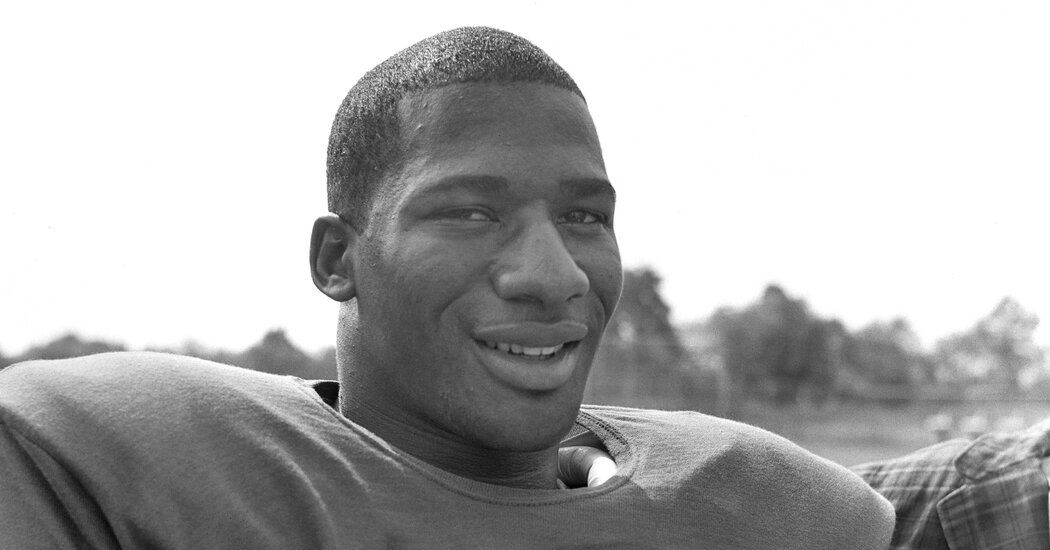
Erich Barnes, the hard-hitting, speedy cornerback who helped propel the Giants to three consecutive N.F.L. championship games in the early 1960s, died on Friday in Hastings-on-Hudson, N.Y. He was 86.
His death, in a hospital, was announced by the Giants, who said it came after a long illness but did not provide additional details.
Playing for 14 seasons — three with the Chicago Bears, four with the Giants and seven with the Cleveland Browns — Barnes was often matched against the league’s best wide receivers.
In his career he intercepted 45 passes and ran seven back for touchdowns. He tied an N.F.L. record for the longest interception return for a touchdown when he picked off a pass by the Dallas Cowboys’ Eddie LeBaron in an October 1961 game and raced 102 yards for a score.
At 6 feet 2 inches and 200 pounds, Barnes had good size for a cornerback of his time.
“I was like a dictator or intimidator,” he told the website scout.com in 2008. “I kept receivers off guard. I never let them get into a rhythm. I always wanted the receiver to go where I wanted him to go.”
Barnes was voted to the Pro Bowl with the Bears in 1959, with the Giants each season from 1961 to 1964, and with the Browns in 1968. He was selected as a first-team All-Pro in 1961, when he intercepted seven passes, returning two for scores.
“Barnes was tall and lean, and he had a little mean streak in him,” the famously rugged Giants middle linebacker Sam Huff recalled in “Tough Stuff: The Man in the Middle” (1988), written with Leonard Shapiro. “If you caught a ball in front of Erich Barnes, he would make you pay for it. And when you caught something near the sideline, you’d better get way out of bounds because Erich would come after you.”
Erich (pronounced EE-rich) Theodore Barnes was born on July 4, 1935, in Elkhart, Ind. His father, Sylvester, was a real estate investor; his mother, Lura, was a homemaker.
Erich grew up a Browns fan. Recruited by Purdue, he played halfback on offense and defense and was a receiver as well. He was chosen by the Bears in the fourth round of the 1958 N.F.L. draft.
Barnes joined the Giants in 1961 via a three-way trade in which they sent cornerback Lindon Crow to the Los Angeles Rams.
Coached by Allie Sherman, the Giants won the Eastern Conference title from 1961 through 1963 but lost every year in the N.F.L. championship game, twice to the Green Bay Packers and then to the Bears.
The Giants teams of that era, featuring Andy Robustelli, Dick Modzelewski, Roosevelt Grier and Jim Katcavage on the line, Huff at linebacker, Barnes and Dick Lynch at cornerback and Jim Patton at safety, turned defensive play into a glamorous part of pro football. Quarterback Y.A. Tittle, obtained from the San Francisco 49ers, became a New York celebrity with his brilliant passing.
Barnes intercepted 18 passes while playing for the Giants, and his block of a Packer punt in the 1962 N.F.L. championship game resulted in an end-zone recovery by Jim Collier, giving the Giants their only touchdown in a 16-7 loss.
One of Barnes’s most spectacular plays came when the Giants played the Philadelphia Eagles at Yankee Stadium in November 1961.
Pete Previte, a clubhouse attendant, suggested to the Giant coaches that, when the time was ripe for a long pass, they put some of the fastest players who weren’t normally used on offense into a formation.
Late in the first half, Sherman inserted Barnes and Patton as slot receivers, replacing two running backs, while keeping his regular pass-catchers, flanker Kyle Rote and ends Del Shofner and Joe Walton, in the game. All five headed downfield, and Tittle threw a 62-yard touchdown pass to Barnes. The Giants won the game, 38-21.
After the Giants’ three conference championship seasons, the core of the team began to depart through trades or retirement.
After going 2-10-2 in 1964, the Giants traded Barnes to the Browns in August 1965. He played on Cleveland teams that went to three N.F.L. championship games — and lost each time, just as his Giants had.
Barnes retired after the 1971 season and became a planner of special events for businesses in the New York area.
He is survived by his wife, Violet Ward Barnes; his daughters, Charissa Barnes-Johnson, Djuna Barnes and Tessa Robinson; his sisters, Joan Murkey and Linda Turner; three grandchildren; and two great-grandchildren. He had homes in Yonkers, N.Y., and Joliet, Ill.
Barnes was a heady player, notwithstanding his reputation for hits that sometimes went over the edge. Sports Illustrated once quoted him as saying that “when I was with the Giants and I would come into Cleveland, they used to call me dirty,” but that after he was traded to the Browns, “the Giants would call me dirty and Cleveland would call me aggressive.”
As he put it, “It all depends on where you were playing.”